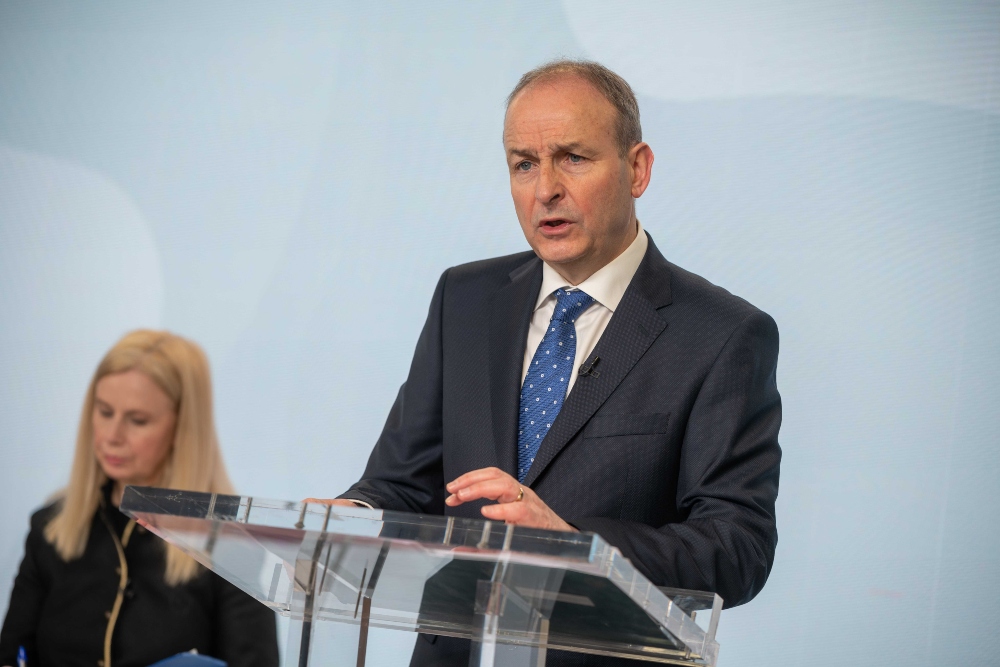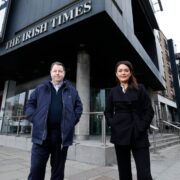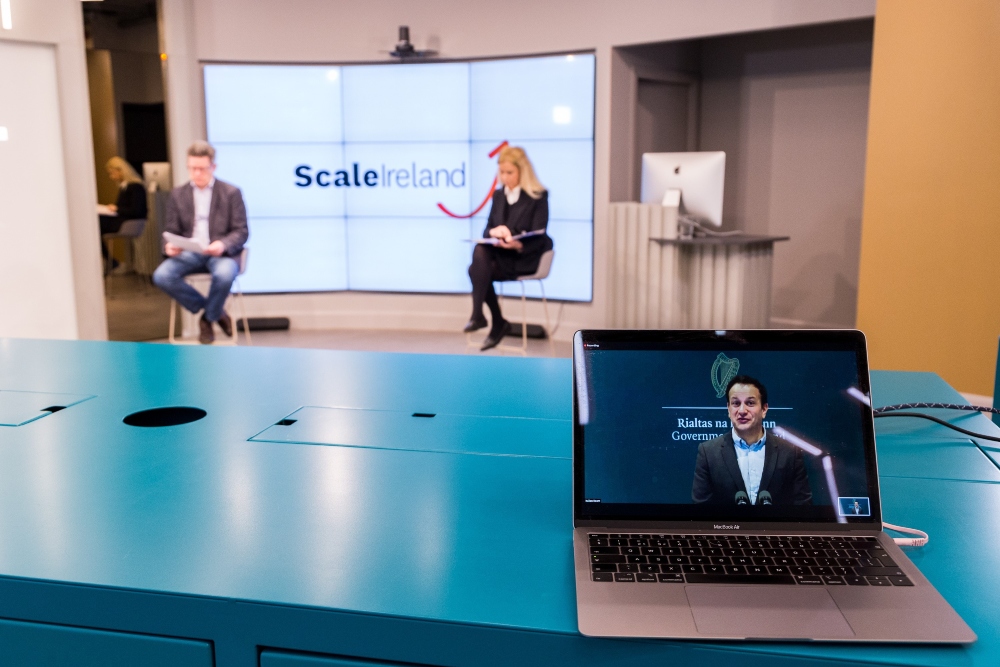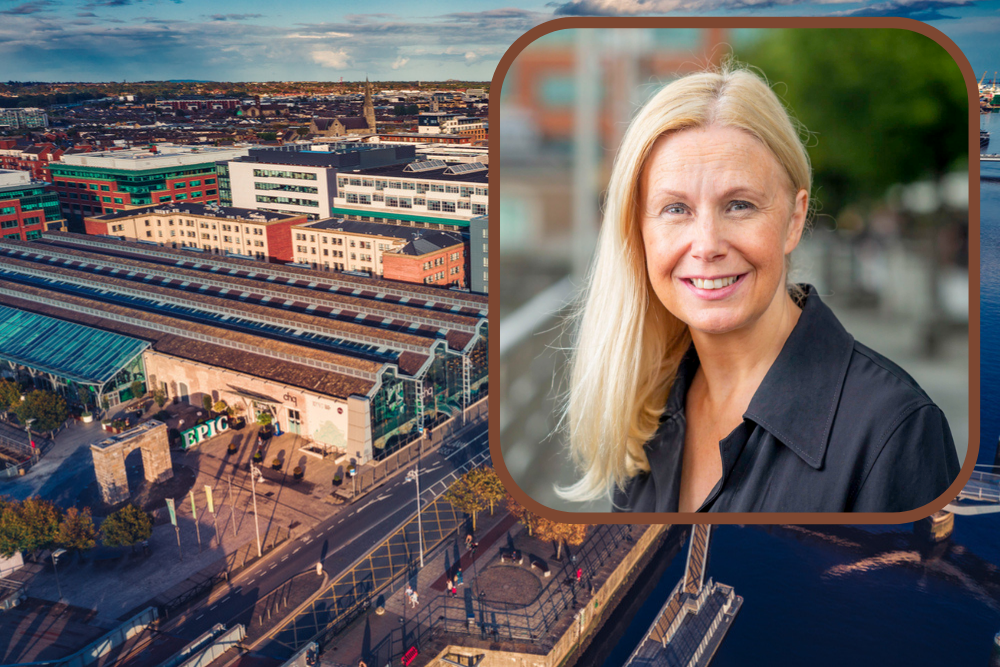Scale Ireland Regional Summit in Cork hears how lasting indigenous prosperity is within our grasp and indigenous tech firms hold the keys.
In recent weeks Flipdish became the fifth home-grown Irish tech company to join the ranks of Irish unicorns- firms valued at more than $1bn – alongside Intercom, Workhuman, Fenergo and LetsGetChecked. Another company called Stripe, founded by two brothers from Nenagh John and Patrick Collison in San Francisco, is the darling of Silicon Valley with a $95bn valuation.
Unless you’ve been asleep under a rock, there are numerous Irish-born companies such as Teamwork from Cork on the verge of joining the unicorn club as they reshape the complex digital tapestry of the world.
“The start-up of today could become the business leader of tomorrow”
This morning in Cork at the Scale Ireland Regional Summit, it was made clear to Taoiseach Micheál Martin, TD, that future Irish unicorns may well come from Cork and other regions in Ireland and that this is no fantasy. The reality will be made even more possible by stringent policy decisions around funding, education and infrastructure.
Across Ireland there are 2,000 indigenous tech start-up and scale-up companies that between them employ 47,000 people.
The growth employers of tomorrow
Microsoft Ireland’s Anne Sheehan told the summit: “We need to work together to create the best financial and policy supports to enable Ireland’s start-ups to grow their businesses.”
She added: “The start-up of today could become the business leader of tomorrow.”
A new report by Scale Ireland revealed that almost half (47%) of businesses said that securing funding was their biggest challenge. Just more than a quarter (25.2%) said that recruitment and retention of staff was the biggest challenge facing start-ups. The cost of doing business (8.7%), tax and regulation burdens (8.7%) and lack of expert advice and support (5.7%) were also cited as challenges.
An example of what is possible can be seen in Cork city’s own success story Teamwork.com which has plans to hire 130 people this year. ”And 92 to of those jobs will be based in Ireland – and all of these are well-paid tech jobs,” said co-founder Peter Coppinger. “At this point in time we will fall short of our plans and hiring is going to be our biggest limiting factor to scaling. We know there is a shortage of workers. In the recent Scale Ireland survey, the stats showed there was a key trend in attracting and keeping staff and how it is becoming more and more difficult for start-ups. 41% of companies lost staff in 2021, which matches our experience.”
Teamwork was founded by Daniel Mackey and Peter Coppinger in 2007 and is one of Cork’s biggest indigenous tech success stories. The business employs 270 people in five countries and in 2019 opened offices in Belfast. In 2018 it was named EY’s Entrepreneur of the Year. Last year it raised $70m after bootstrapping itself for 12 years.
The war for talent
Coppinger said that young but successful companies like Teamwork are competing against multinationals for salaries at a ratio of 3:1 against the indigenous players. “It’s just the environment we are in,” he shrugged. “But in order to attract and retain employees one of the best tools at our disposal is share options.”
He called on the Taoiseach to remove the limits on share options that Irish indigenous companies can grant in any one year. “This would be a game-changer for us and our sector.”
Coppinger pointed out that with changes to corporation tax this will create a drain on Ireland’s multinational sector and the time is now to make investments in Ireland’s indigenous future. He said Ireland should learn lessons from Israel which has modelled itself the start-up nation.
He suggested low interest loans as a potential solution. “Instead of taking equity in start-ups we need to ramp up our investment in high potential start-ups significantly; we need to minimise the amount of red tape around start-ups, especially in terms of R&D. Smaller companies don’t avail of the R&D credits because they are too onerous.”
Also present was Fenergo co-founder Cork-based Niall Twomey. Fenergo, which was founded in 2009 and now employs 850 people, recently joined the unicorn club after selling a majority stake for $600m.
Twomey agreed the war for talent is having a corrosive effect on the indigenous tech business community. “The war for talent is very competitive. We set our selves up to operate from anywhere. Our investors want to see us grow in value five times what we are currently worth today. We currently have 60 jobs available in Ireland. As we grow at least 50% to 60% of our work base will continue to be in Ireland, but the rest will be in international locations.”
Twomey credited Enterprise Ireland with Fenergo’s international growth. “They were a gateway for us internationally and were able to open doors for us that we wouldn’t have been able to open.”
Cut the red tape

Taoiseach Micheál Martin at the Scale Ireland Regional Summit in Cork
Gillian Buckley from the Western Development Commission said that while the State bodies do a fantastic job in supporting businesses, there is only so much they can do and that private sector investment is crucial to filling that gap. “The tax code is a huge opportunity. There are good supports out there but we seem to over-complicate them. We need to simplify them, especially for the early stage businesses.”
She cited the KEEP incentive for share options that had an uptake of only 100 employees across Ireland in 2018. “There is a fantastic opportunity there but it is not being utilised. Why is that? Because it is too complicated and it’s not being promoted.”
Buckley added that with the oncoming auto-enrollment system for pensions there is a once-in-a-generation opportunity to ensure that there is a much broader base of private funding from pensions that could be deployed to create jobs and help save for future pensions.
Taoiseach Micheal Martin said he agreed with many of the assertions. “The next 50 years should represent a very significant, accelerated and advanced push and the indigenous entrepreneur will be the big story when people are looking back in 50 years time to where there was a big shift in the Irish approach.
“We do have to become more innovative around share options,” he said. “I’m passionate about R&D, I think it is key.”
Martin said that Ireland has witnessed a massive transformation of R&D within its third level institutions and said we need to accelerate how indigenous firms are incentivised to engage in R&D and make it more business friendly.
Minister for Public Expenditure and Reform Michael McGrath, TD, said policymakers are aware of the inroads that indigenous tech firms are making.
“We are listening, because we share your ambition to create the most advantageous conditions in Ireland for tech start-ups and scale-ups to succeed. And working together in the spirit of collaboration I believe that we can achieve something special here in Ireland and a productive start-up environment is essential for a sustainable economy.
“Start-ups are drivers of employment, of growth and innovation.
“This innovation is crucial for productivity and for the growth of our overall economy.”
The evidence is abundant that indigenous companies are the economic powerhouses of Ireland’s future. But they can only deliver this future if they can prosper without the frictions that don’t seem to affect their multinational counterparts.
It really is a once-in-a-generation opportunity.
Main image at top (from left): Minister Michael McGrath; Anne Sheehan, Microsoft Ireland; Brian Caulfield, chair, Scale Ireland; Taoiseach Micheál Martin; Scale Ireland CEO Martina Fitzgerald; Dr Helen McBreen; and Neil Sullivan, Hadfield Green.





